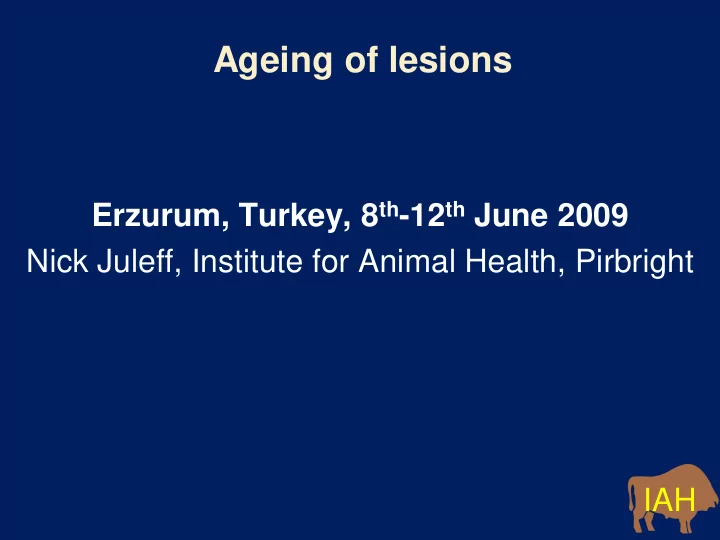

Ageing of lesions Erzurum, Turkey, 8 th -12 th June 2009 Nick Juleff, Institute for Animal Health, Pirbright IAH
Why estimate age of lesion? • Age range of lesions-particularly the oldest lesion Essential for case history and epidemiological report Pre-requisite to determine origin of infection Duration and weight of virus excretion Prediction of further spread IAH
Estimating the age of lesions Day of Clinical Appearance of lesion Disease Day 1 Blanching of epithelium followed by formation of fluid filled vesicle Day 2 Freshly ruptured vesicles characterised by raw epithelium, a clear edge to the lesion and no deposition of fibrin Day 3 Lesions start to lose their sharp demarcation and bright red colour. Deposition of fibrin starts to occur. Day 4 Considerable fibrin deposition has occurred and regrowth of epithelium is evident at the periphery of the lesion. Day 7 Extensive scar tissue formation and healing has occurred. Some fibrin deposition is usually still present. http://www.defra.gov.uk/animalh/diseases/fmd/about/clinical.htm IAH State Veterinary Journal, 5,Number 3, October 1995, pages 4 – 8
Estimating the age of lesions Photographs of contact exposure – field and experimental Clinical manifestation may vary between strains – especially sheep Complicated by secondary infections Between day 0 and 5 – one day margin of accuracy IAH
Cattle - Day 1 Unruptured tongue vesicle, fluid filled, blanching of epithelium IAH
Cattle - Day 1 One day old vesicle, ruptured when tongue drawn from mouth IAH
Cattle - Day 2 Note raw epithelium, clear edge to lesion and no deposition of fibrin IAH
Cattle - Day 2 Field example. Note raw epithelium, clear edge to lesion and no deposition of fibrin IAH
Cattle - Day 2 No raw epithelium, clear edge to lesion and no deposition of fibrin IAH
Cattle - Day 3 Lesions start to lose their sharp demarcation, fibrin deposition starts to occur on edge of lesions IAH
Cattle - Day 4 Considerable fibrin deposition has occurred and regrowth of epithelium is evident at edge of lesion IAH
Cattle - Day 5 Note progressive loss of lesion margination and extensive fibrin infilling IAH
Cattle - Day 7 Field example. Extensive scar tissue formation and healing has occurred. Some fibrin deposition is usually IAH still present
Cattle - Day 10 Scarring and indentation at site of lesion, fibrous tissue proliferation, loss of papillae IAH
Cattle - Day 1 Unruptured vesicle, fluid filled, blanching of epithelium IAH
Cattle - Day 2 Ruptured vesicle, note raw epithelium, clear edge to lesion and no deposition of fibrin IAH
Cattle - Day 3 Note friable epithelium, deposition of fibrin starting to occur IAH
Cattle - Day 4 Considerable fibrin deposition IAH
Cattle - Day 4 Considerable fibrin deposition and regrowth of epithelium IAH
Cattle - Day 5 Granulation/regrowth of epithelium IAH
Cattle - Day 7 Healing progressing under the necrotic epithelium IAH
Cattle - Day 11 Note healing and under-running of horn tissue IAH
Cattle - Day 1 IAH
Sheep - Day 1 Note necessity to reflect hair to view the lesion IAH
Sheep - Day 2 Ruptured and unruptured coronary band vesicle IAH
Sheep - Day 3 Sero-fibrinous exudate and swelling IAH
Sheep - Day 4 Signs of early healing IAH
Sheep - Day 6 Scab formation and healing IAH
Sheep - Day 10 Note under-running of horn tissue IAH
Sheep - Day 1 IAH
Sheep - Day 2 Note sharp lesion margins IAH
Sheep - Day 3 Note rapid loss of edge definition of lesion IAH
Sheep - Day 4 IAH
Sheep - Day 6 IAH
Sheep - Day 7 IAH
Pigs Most information obtained from foot lesions If lesion is at coronary band < 1 week old Thereafter horn grows at 1mm per week IAH
Pigs – Day 1 IAH
Pigs – Day 3 Note deposition of fibrin IAH
Pigs – Day 4 Note extensive fibrinous in-filling IAH
Pigs – Day 8 Healing lesion IAH
Pigs – Day 1 IAH
Pigs – Day 3 Supernumerary digits IAH
Pigs – Day 9 IAH
Acknowledgements David Paton Bryan Charleston Colleagues at the Institute for Animal Health IAH
Recommend
More recommend